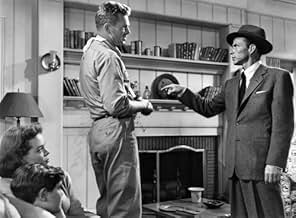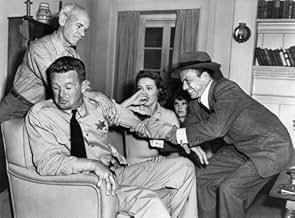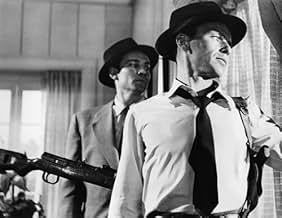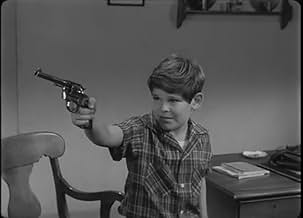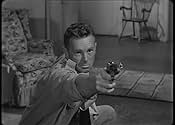IMDb रेटिंग
6.8/10
7.9 हज़ार
आपकी रेटिंग
अपनी भाषा में प्लॉट जोड़ेंIn the city of Suddenly, three gangsters trap the Benson family in their own house, on the top of a hill nearby the railroad station, with the intention of killing the president of the USA.In the city of Suddenly, three gangsters trap the Benson family in their own house, on the top of a hill nearby the railroad station, with the intention of killing the president of the USA.In the city of Suddenly, three gangsters trap the Benson family in their own house, on the top of a hill nearby the railroad station, with the intention of killing the president of the USA.
James O'Hara
- Jud Hobson
- (as James Lilburn)
John Beradino
- Trooper
- (बिना क्रेडिट के)
Richard Collier
- Ed Hawkins
- (बिना क्रेडिट के)
Roy Engel
- Driver Asking Slim for Directions
- (बिना क्रेडिट के)
Hans Moebus
- Schultz
- (बिना क्रेडिट के)
Ted Stanhope
- Driver Asking Tod for Directions
- (बिना क्रेडिट के)
फ़ीचर्ड समीक्षाएं
...Sinatra is great as hired assassin John Baron who's half million dollar job is to off the POTUS when his train stops in Suddenly, California.
If you've ever read Black Mask or any of the old crime pulps, Suddenly has that kind of vibe. Tough, highly stylized talk and attitude takes center stage in spite of any lick of logical behavior or plot coherence. I'm serious here, kids, the story is a mess. So, the decent 7 rating is for one reason only: Blue Eyes is that good.
A must see for Sinatra fans and a definite gripper for those who can really, really, really suspend disbelief.
If you've ever read Black Mask or any of the old crime pulps, Suddenly has that kind of vibe. Tough, highly stylized talk and attitude takes center stage in spite of any lick of logical behavior or plot coherence. I'm serious here, kids, the story is a mess. So, the decent 7 rating is for one reason only: Blue Eyes is that good.
A must see for Sinatra fans and a definite gripper for those who can really, really, really suspend disbelief.
The movie kicked up something of a fuss at the time (1954). After all, Ike Eisenhower was not only a popular president but a war hero as well. It's probably no stretch to say that, yes indeed, everybody liked Ike. So this was a pretty nervy production for the conformist 1950's. Then too, it's likely no accident that the movie was produced independently of the Hollywood studios. I doubt any studio, big or little, would have okay'ed such touchy subject matter as killing a president. But the 70 minutes does amount to an effective little suspenser, as assassins and hostages crowd into a living room perch awaiting the president's sitting-duck arrival, while the tension mounts.
The movie came along during a low point of Sinatra's career before his 1954 Oscar reversed the slump. That's probably one reason he would take on such a risky role as the thoroughly dis-likable assassin. And visually, especially, Sinatra's's quite good. As a result, when Baron says he would be nothing without his gun, Sinatra's scrawny non-Hollywood appearance confirms the fact. Just as importantly, he gives the would-be assassin the right kind of nervous edge.
There's a fairly obvious theme working through the screenplay— namely that despite pacifist wishes, violence does have a moral place in life. As events in the movie turn out, the only way to stop Baron's immoral use of violence is with morally sanctioned counter-violence. The screenplay makes the point by showing us that had Pidge gone along with Mom's anti-gun wishes, the assassination plot would have succeeded. So fortunately-- the movie implies-- when push comes to shove, Pidge follows the men in his life and the plot fails.
For Cold War audiences of the day, the political lesson is pretty clear—only guns and muscle will stop Soviet plans to destroy "The American Way". Of course, the film never identifies the authors of the plot, but I'm sure audiences came to the obvious political conclusion. It's probably also telling that guns are identified with manly men and only a frightened woman, the mother, opposes them. Mom's doubts may be understandable given her husband's violent death. However, by ignoring Mom's wishes, no matter how understandable, Pidge comes to represent a future in which gun violence and armed national defense will continue to be morally necessary. Beneath the surface, it appears, lies some pretty heavy symbolism.
Subtexts aside, Suddenly remains a gripping film even this many years later. That's pretty darn good for a cheap production using basically one set for most of the action. But, I expect it's really the touchy subject matter that continues to excite viewers and separate the film from more routine suspensers of the day.
The movie came along during a low point of Sinatra's career before his 1954 Oscar reversed the slump. That's probably one reason he would take on such a risky role as the thoroughly dis-likable assassin. And visually, especially, Sinatra's's quite good. As a result, when Baron says he would be nothing without his gun, Sinatra's scrawny non-Hollywood appearance confirms the fact. Just as importantly, he gives the would-be assassin the right kind of nervous edge.
There's a fairly obvious theme working through the screenplay— namely that despite pacifist wishes, violence does have a moral place in life. As events in the movie turn out, the only way to stop Baron's immoral use of violence is with morally sanctioned counter-violence. The screenplay makes the point by showing us that had Pidge gone along with Mom's anti-gun wishes, the assassination plot would have succeeded. So fortunately-- the movie implies-- when push comes to shove, Pidge follows the men in his life and the plot fails.
For Cold War audiences of the day, the political lesson is pretty clear—only guns and muscle will stop Soviet plans to destroy "The American Way". Of course, the film never identifies the authors of the plot, but I'm sure audiences came to the obvious political conclusion. It's probably also telling that guns are identified with manly men and only a frightened woman, the mother, opposes them. Mom's doubts may be understandable given her husband's violent death. However, by ignoring Mom's wishes, no matter how understandable, Pidge comes to represent a future in which gun violence and armed national defense will continue to be morally necessary. Beneath the surface, it appears, lies some pretty heavy symbolism.
Subtexts aside, Suddenly remains a gripping film even this many years later. That's pretty darn good for a cheap production using basically one set for most of the action. But, I expect it's really the touchy subject matter that continues to excite viewers and separate the film from more routine suspensers of the day.
When the President decides to pass through the small town of Suddenly on route to a fishing trip, the town's police and chief officials rise to meet the challenge of assuring his protection as there have been rumors of an assassination attempt.
The hired guns meanwhile make plans of their own. They cleverly trick their way into the home of the best house in town from which to try and carry out their assassination plot - the house of Pop Benson, respected citizen with an house upon an hill that overlooks the President's planned arrival destination. Now only an handful of hostages stand between the President and doom...can they in some way warn him in time?
Frank Sinatra steals the show here as the ruthless criminal mastermind behind the want-to-be assassins - a man named John Baron. He is downright brutal and nasty in the role--an utterly detestable villain who does remind us the it was the army that created him and made him into a killer or maybe deep down, it's just that he was always a killer at heart. An outstanding multi-dimensional performance from Sinatra.
Sterling Hayden meanwhile plays the idealistic police sheriff Tod Shaw, who believes in America and the American way and supports unquestioningly the system and will do whatever it takes to preserve the America he believes is right and just. He too served in the military to protect rights and freedoms and now carries on the good fight as Suddenly's sheriff. An interesting contrast of two extremes with the pacifist minded Ellen Benson (played here by Nancy Gates), her becoming a widow after her husband got killed in the war, finally forced to take a stand at the film's climax.
Daring for its time, this film deals with surprisingly intense subject matter for the early 1950s. Quite good.
The hired guns meanwhile make plans of their own. They cleverly trick their way into the home of the best house in town from which to try and carry out their assassination plot - the house of Pop Benson, respected citizen with an house upon an hill that overlooks the President's planned arrival destination. Now only an handful of hostages stand between the President and doom...can they in some way warn him in time?
Frank Sinatra steals the show here as the ruthless criminal mastermind behind the want-to-be assassins - a man named John Baron. He is downright brutal and nasty in the role--an utterly detestable villain who does remind us the it was the army that created him and made him into a killer or maybe deep down, it's just that he was always a killer at heart. An outstanding multi-dimensional performance from Sinatra.
Sterling Hayden meanwhile plays the idealistic police sheriff Tod Shaw, who believes in America and the American way and supports unquestioningly the system and will do whatever it takes to preserve the America he believes is right and just. He too served in the military to protect rights and freedoms and now carries on the good fight as Suddenly's sheriff. An interesting contrast of two extremes with the pacifist minded Ellen Benson (played here by Nancy Gates), her becoming a widow after her husband got killed in the war, finally forced to take a stand at the film's climax.
Daring for its time, this film deals with surprisingly intense subject matter for the early 1950s. Quite good.
Good old flick. I really like the basis of the idea, it's simple but meaningful. As with most of these old films it's basically 85% exposition and therefore in need of a great leading man to sell the dialogue, and Sinatra is the man for the job. The constant introduction of new characters mixed with the exposition cancels out any sort of fear for the audience, instead you just follow along and see what happens. Overall it's a film worth watching.
The movie focuses US President protected by Secret Service (Willis Bouchey as Chief agent) who passes through a small and peaceable town called Suddenly where only the sheriff (Sterling Hayden) executes the law . One house inhabited by a grandfather (James Gleason) , a widow (Nancy Gates) and son is ideal place for a criminal scheme by means of an ambush , designed and pulled off by ominous murderers commanded by a ruthless psycho assassin (Frank Sinatra).
The film has got emotion , strain , suspense , thriller and although is mostly developed on interior scenarios , it doesn't make boring neither tiring . Release was withdrawn from circulation for the Dallas assassination (1963) because of the events are pretty similar . Frank Sinatra (JFK's friend) as producer ordered the retaining copies and the movie was forgotten , however long time later was issued in video market and obtained a lot of success . Frank Sinatra's interpretation is top-notch as the cruel and brutal killer , his acting is magnificent , he's the best . Attractive Nancy Gates is the pacifist widow who hates the guns and embittered for her husband's death during WWII . Sterling Hayden interprets properly a kind and valiant police believer of the ¨American way of life¨ . James Gleason as stiff and rigid veteran is very fine . Atmospheric cinematography and agreeable musical score by David Raksin (author of Laura's score) . The motion picture was well directed by Lewis Allen (he directed some noir classic films). Rating : Interesting , worthwhile seeing and it will appeal to Frank Sinatra fans.
The film has got emotion , strain , suspense , thriller and although is mostly developed on interior scenarios , it doesn't make boring neither tiring . Release was withdrawn from circulation for the Dallas assassination (1963) because of the events are pretty similar . Frank Sinatra (JFK's friend) as producer ordered the retaining copies and the movie was forgotten , however long time later was issued in video market and obtained a lot of success . Frank Sinatra's interpretation is top-notch as the cruel and brutal killer , his acting is magnificent , he's the best . Attractive Nancy Gates is the pacifist widow who hates the guns and embittered for her husband's death during WWII . Sterling Hayden interprets properly a kind and valiant police believer of the ¨American way of life¨ . James Gleason as stiff and rigid veteran is very fine . Atmospheric cinematography and agreeable musical score by David Raksin (author of Laura's score) . The motion picture was well directed by Lewis Allen (he directed some noir classic films). Rating : Interesting , worthwhile seeing and it will appeal to Frank Sinatra fans.
क्या आपको पता है
- ट्रिवियाMontgomery Clift turned down the lead role.
- गूफ़With the rifle locked in place, the chance of the President being exactly in line of fire is slim to none.
- भाव
John Baron: I'm not actor, bustin' my leg on a stage so I can yell 'down with the tyrants'. If Booth wasn't such a ham he might've made it.
- इसके अलावा अन्य वर्जनAlso available in a computer colorized version.
- कनेक्शनEdited into Your Afternoon Movie: Suddenly (2022)
टॉप पसंद
रेटिंग देने के लिए साइन-इन करें और वैयक्तिकृत सुझावों के लिए वॉचलिस्ट करें
- How long is Suddenly?Alexa द्वारा संचालित
विवरण
बॉक्स ऑफ़िस
- US और कनाडा में सकल
- $14,00,000
- चलने की अवधि
- 1 घं 17 मि(77 min)
- रंग
- पक्ष अनुपात
- 1.75 : 1
इस पेज में योगदान दें
किसी बदलाव का सुझाव दें या अनुपलब्ध कॉन्टेंट जोड़ें


